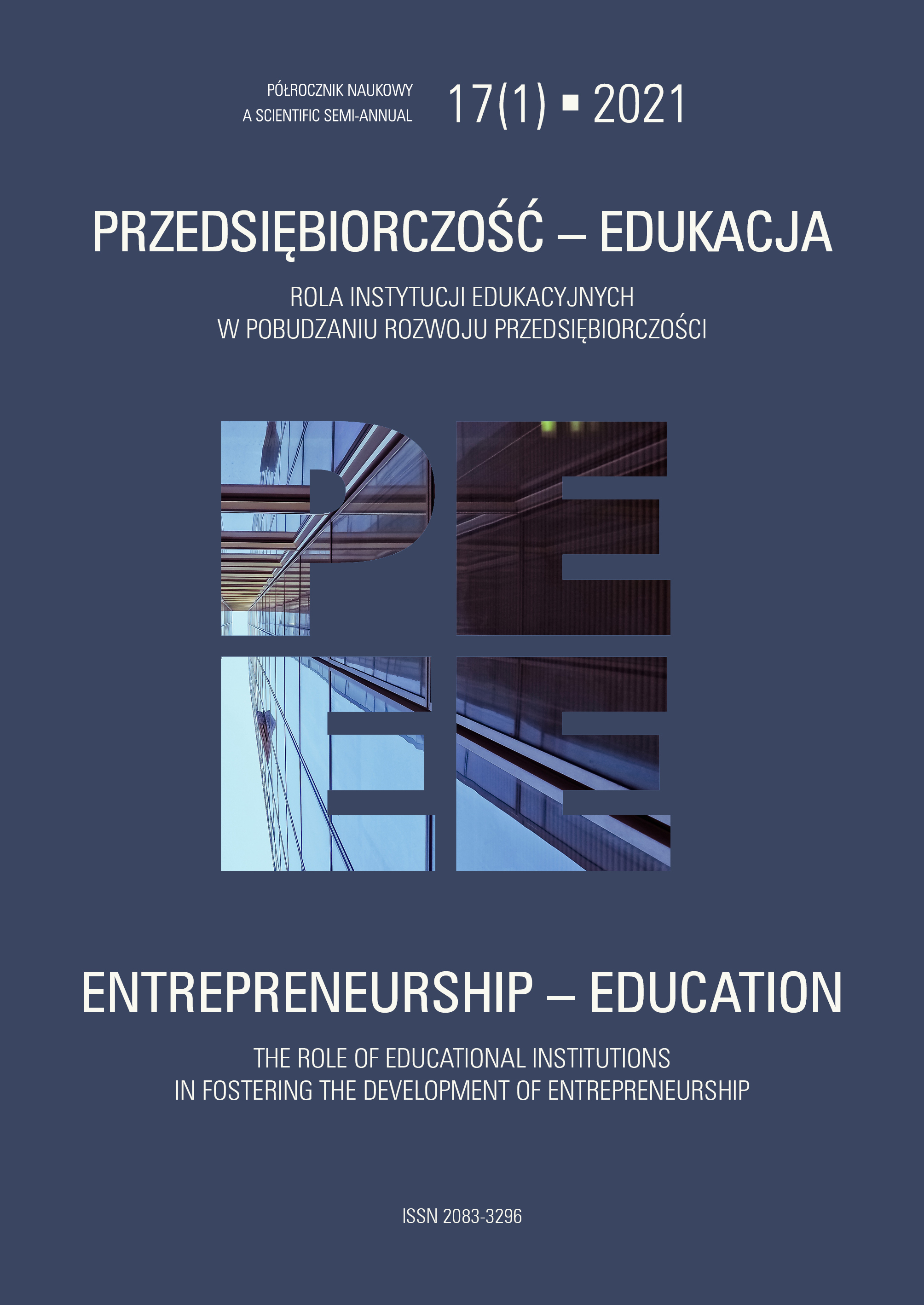Impact of the environment on the motivation to choose studies by university students in Rzeszów (Poland)
DOI:
https://doi.org/10.24917/20833296.171.10Keywords:
counsellor, education, environment, family, motivation, workAbstract
Motivation is a human activity that depends on one’s living environment. The environment of parents, siblings, grandparents, friends and acquaintances shapes the child’s perception of the world, influences their taking various life activities, and also implies various motives for creating human behaviour. The article aimed to broaden the knowledge on the significance of said influence on the motivation to chose the fields of study of academic youth divided by gender. The research problem was the respondents’ perception of the influence that parents, family traditions, peers, teachers, media, and career counsellor have when it comes to choosing a field of study, while also taking into account the ease of getting into a given field of study. A null hypothesis (H0) was assumed, stating no differentiation of the subjects at the level of statistical significance by gender. The performed calculations did not show any differences at the level of statistical significance. Higher percentages were obtained by women in terms of the influence of family, family traditions, teachers, media, ease of getting into university and career counsellor, except for the influence of acquaintances. The research broadened the knowledge about the small influence of the school environment of young people, especially the vocational counsellor, on the motivation to chose particular fields of study. It is postulated to increase the support possibilities on the part of the school, especially the vocational counsellor, to increase young people’s awareness regarding the proper selection of their education path.
References
Bronfenbrenner, U. (2009). The ecology of human development: Experiments by Nature and design. Harvard University Press: Cambridge.
Brown-Jeffy, S., Cooper, J.E. (2011). Toward A Conceptual Framework Of Culturally Relevant Pedagogy. Teacher Education Quarterly, 38(1), 65–84.
Chodkowski, Z. (2019a). Adaptacja człowieka do środowiska pracy. Rzeszów: Wydawnictwo Uniwersytetu Rzeszowskiego.
Chodkowski, Z. (2019b). Autoocena własnych szans funkcjonowania zawodowego po ukończeniu studiów pedagogicznych. Szkoła – Zawód – Praca, 17, 201–216. doi: 10.34767/SZP.2019.01.14
Chodkowski, Z. (2019c). Plany zawodowe studentów pedagogiki Uniwersytetu Rzeszowskiego w kontekście miejsca ich zamieszkania. Zarządzanie Publiczne, 2(46), 171–187. doi: 10.4467/20843968ZP.19.011.10687
Farnicka, M., Liberska, H., (2014). Tworzenie środowiska sprzyjającego uczeniu się – analiza wybranych czynników. Teraźniejszość – Człowiek – Edukacja, 67(3), 57–71.
Janik, A. (2019, 19 lipca). Podkarpacie się wyludnia. Mało się nas rodzi, za dużo migruje. Pozyskano z: https://plus.nowiny24.pl/podkarpacie-sie-wyludnia-malo-sie-nas-rodzi-za-duzo-migruje/ar/c1-14268967
Kim, Y., Mok, S.Y., Seidel, T. (2020). Parental Influences on Immigrant Students’ Achievement-Related Motivation and Achievement: A Meta-Analysis, Educational Research Review, 30.
Kocowski, T., (1993). Motywacja. W: W. Pomykało (red.), Encyklopedia pedagogiczna. Warszawa: Fundacja Innowacja, 384–389.
Mantica, A., Moneva, J., Malbas, M. (2020). Family Status and Self-Motivation in Studies. International Research in Education, 8(1), 124–138.
Messineo, L., Allegra, M., Seta, L. (2019). Self-reported motivation for choosing nursing studies: a self-determination theory perspective. BMC Medical Education, 19(192). doi: 10.1186/s12909-019-1568-0
Miciura, B. (2020, 15 kwietnia). Szkoła jako środowisko wychowawcze. Pozyskano z: http://www.publikacje.edu.pl/publikacje.php?nr=5836
Nadobnik, J., Tarnowski, M., Nowak, M.A. (2017). Motives for Choosing Studies as Predictors of Career Plans of Tourism and Recreation Students. Central European Journal of Sport Sciences and Medicine, 18(2), 107–118. doi: 10.18276/cej.2017.2-11
Nowak, J. (2015). Środowisko uczące – (nie)doceniony obszar edukacji. Lubelski Rocznik Pedagogiczny, XXXIV(2), 63–75. doi: 10.17951/lrp.2015.34.2.63
Poleszczuk, J. (2017). Decyzje edukacyjne maturzystów. Kontekst społeczny i indywidualne postawy młodzieży Białegostoku wobec wykształcenia wyższego. Pogranicze. Studia Społeczne, XXXI, 13–
doi: 10.15290/pss.2017.31.01
Reykowski, J. (1992). Procesy emocjonalne. Motywacja. Osobowość. W: T. Tomaszewski (red.), Psychologia ogólna. Warszawa: Wydawnictwo Naukowe PWN.
Rozporządzenie Ministra Edukacji Narodowej z dnia 16 sierpnia 2018 r. w sprawie poradnictwa zawodowego (Dz.U. 2018, poz. 1675).
Tołwińska, B. (2009). Motywacja dzieci do uczenia się (problemy dzieci, rola dorosłych). W: J. Izdebska,
J. Szymanowska (red.), Wielowymiarowość przestrzeni życia współczesnego dziecka. Białystok: Trans Humana Wydawnictwo Uniwersyteckie, 195–203.
Zimbardo, P.G., Johnson, R.L., McCann, V. (2010). Psychologia. Kluczowe Koncepcje. Motywacja i uczenie się. Warszawa: Wydawnictwo Naukowe PWN.
Downloads
Published
How to Cite
Issue
Section
License
Articles are published under the terms of the Creative Commons License (CC BY-ND 4.0; Attribution– NoDerivs).

